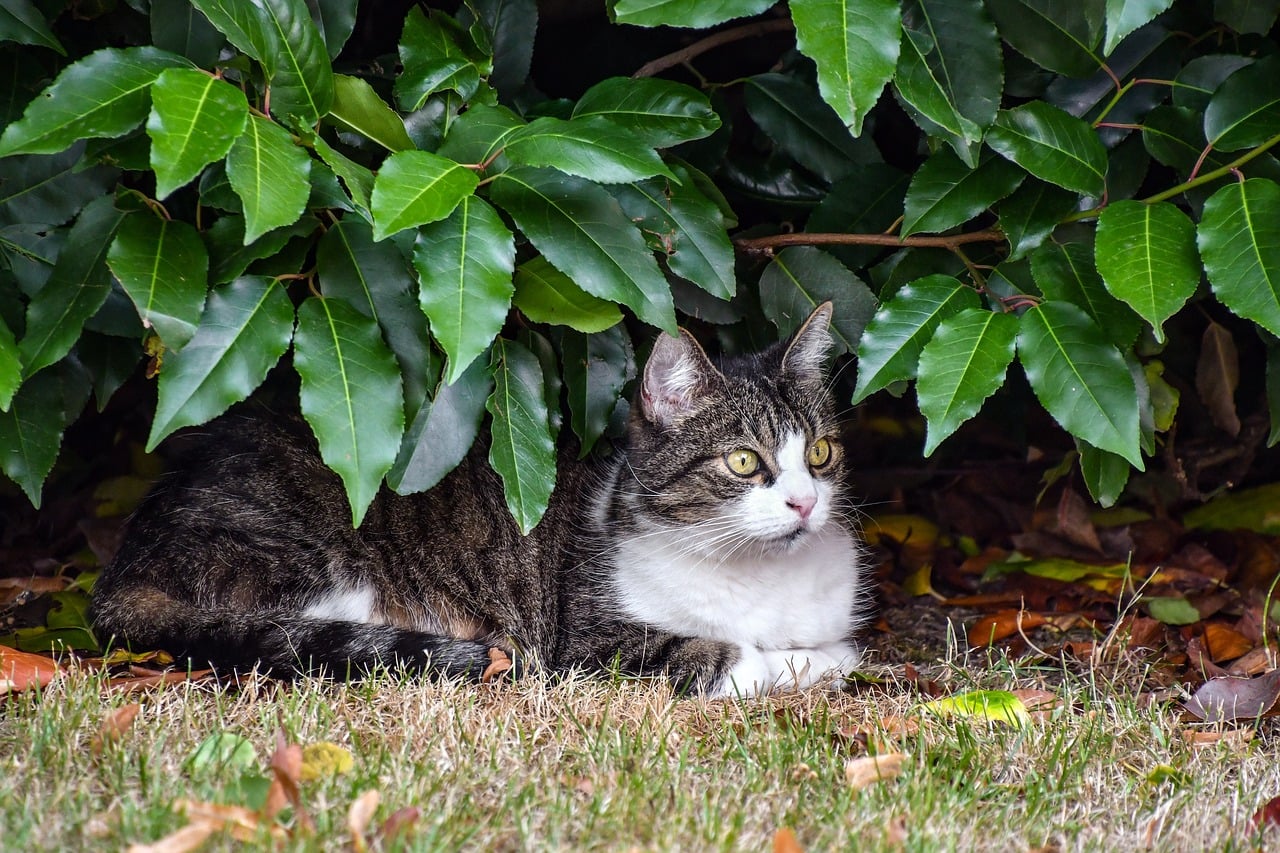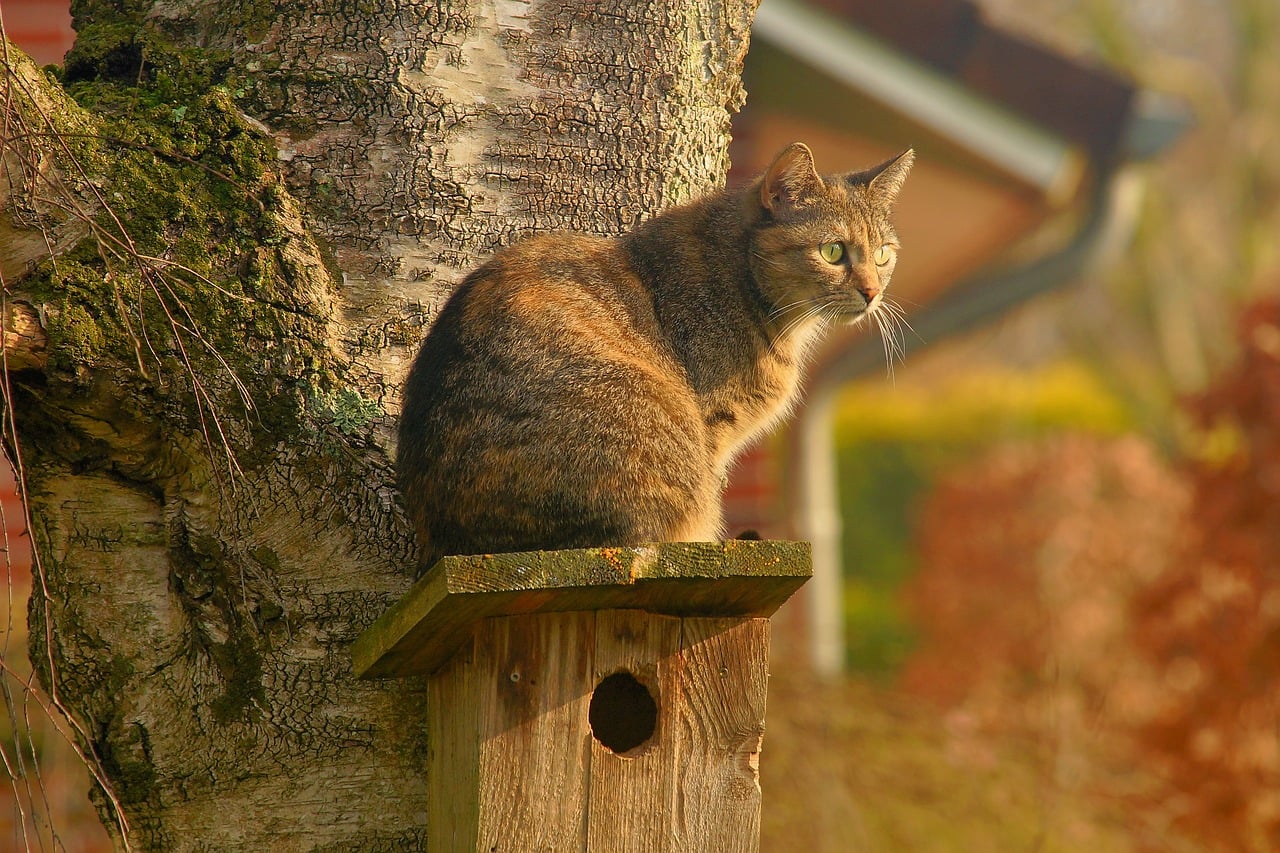Cats are magnificent animals with their nimble movements and quick reflexes. Many families consider cats to be part of the household. Kids and adults alike appreciate the companionship of these furry creatures.
The Problem with Pet Cats
Australia currently has more than 2.1 million feral cats, of which domestic pets are not included. Families are expected to practice responsible pet ownership with these felines, but there are homeowners who are unable to supervise their pet cats.
In fact, recent studies show that domestic cats kill around 61 million native birds each year! This level of predatory behaviour spells trouble for many bird species, and the ecosystem itself, as this means cats could threaten wildlife.
Aside from the danger they pose to other creatures, cats could also do damage to your garden. It’s quite irritating when you find cat urine and excrement anywhere near your flowering plants, garden beds or shrubs. It’s certainly a cause for concern when you find it near your vegetables.
Cat faeces can contain parasites like roundworms, hookworms and tapeworms. There’s also the parasite that causes toxoplasmosis, a disease that is quite risky for pregnant women. These infections are avoidable if you wear gloves and wash your hands after disposing of cat faeces. Also, washing any harvested crops from your raised garden bed or land will prevent any chances of catching these parasites.
 " data-srcset="/wp-content/uploads/2018/08/How-to-Keep-Cats-Out-of-the-Garden-2-20x13.jpg 20w, /wp-content/uploads/2018/08/How-to-Keep-Cats-Out-of-the-Garden-2-200x133.jpg 200w, /wp-content/uploads/2018/08/How-to-Keep-Cats-Out-of-the-Garden-2-300x200.jpg 300w, /wp-content/uploads/2018/08/How-to-Keep-Cats-Out-of-the-Garden-2-400x267.jpg 400w, /wp-content/uploads/2018/08/How-to-Keep-Cats-Out-of-the-Garden-2-600x400.jpg 600w, /wp-content/uploads/2018/08/How-to-Keep-Cats-Out-of-the-Garden-2-768x512.jpg 768w, /wp-content/uploads/2018/08/How-to-Keep-Cats-Out-of-the-Garden-2-800x533.jpg 800w, /wp-content/uploads/2018/08/How-to-Keep-Cats-Out-of-the-Garden-2-1024x682.jpg 1024w, /wp-content/uploads/2018/08/How-to-Keep-Cats-Out-of-the-Garden-2-1200x800.jpg 1200w, /wp-content/uploads/2018/08/How-to-Keep-Cats-Out-of-the-Garden-2.jpg 1280w" data-sizes="auto" data-orig-sizes="(max-width: 1280px) 100vw, 1280px" />
" data-srcset="/wp-content/uploads/2018/08/How-to-Keep-Cats-Out-of-the-Garden-2-20x13.jpg 20w, /wp-content/uploads/2018/08/How-to-Keep-Cats-Out-of-the-Garden-2-200x133.jpg 200w, /wp-content/uploads/2018/08/How-to-Keep-Cats-Out-of-the-Garden-2-300x200.jpg 300w, /wp-content/uploads/2018/08/How-to-Keep-Cats-Out-of-the-Garden-2-400x267.jpg 400w, /wp-content/uploads/2018/08/How-to-Keep-Cats-Out-of-the-Garden-2-600x400.jpg 600w, /wp-content/uploads/2018/08/How-to-Keep-Cats-Out-of-the-Garden-2-768x512.jpg 768w, /wp-content/uploads/2018/08/How-to-Keep-Cats-Out-of-the-Garden-2-800x533.jpg 800w, /wp-content/uploads/2018/08/How-to-Keep-Cats-Out-of-the-Garden-2-1024x682.jpg 1024w, /wp-content/uploads/2018/08/How-to-Keep-Cats-Out-of-the-Garden-2-1200x800.jpg 1200w, /wp-content/uploads/2018/08/How-to-Keep-Cats-Out-of-the-Garden-2.jpg 1280w" data-sizes="auto" data-orig-sizes="(max-width: 1280px) 100vw, 1280px" />
How to Keep Cats Out of the Garden
You may be tired of cleaning up after feline pets or concerned about the health risks, but you don’t have to resent cats – or your cat-loving neighbours. Instead, you can try some home remedies that will solve your problem. Here are a few ways to keep cats away from your garden:
Make the garden soil spiky
Cats are known to prefer smooth and soft surfaces to walk on than bristly ones. Hence, you can make your garden less inviting for them by adding prickly objects on the ground.
For instance, spread some twigs a few inches apart over your garden beds. You can also push pinecones, dried trimmings and other organic materials into your soil, targeting areas that are around your precious plants and flowers.
Thorny bushes can also be used. Just like humans, cats dislike going near these, so this will be quite effective. Lay down cuttings from shrubs like holly, roses or blackthorn along with mulch to protect your garden.
Lastly, you can place chicken wire or mesh fabric over the ground. Just make sure to provide an opening if there are budding plants in the soil.
Use a homemade cat repellent
To make a special cat repellent, mix 1 teaspoon of black pepper, dry mustard, cinnamon, crushed garlic cloves and citrus oil. Put the mixture in a spray bottle and fill with water. Spray this on your lawn and garden beds. The pungent smell is said to keep cats away.
Use tin foil
This is an easy method to rid your garden of cats. How does it work? Well, cats can hear ultrasonic frequencies that are inaudible to us. High-pitched sounds (e.g., banging metals, jangling keys) are unpleasant for felines.
Since tin foil can easily rustle when placed outdoors, this will irritate cats so much that they will avoid going into the area where the sound is made. You can make tin foil flags around the garden to get a high-frequency cat deterrent.
Take note, though, that older or deaf cats may not be as sensitive to these sounds, so this method may not work on them.
Try axle grease
This thick lubricant is a quick remedy for garden owners who don’t want cats in their garden. Cats avoid sticky substances, as they would have a hard time licking and cleaning their fur if it’s sticky. So, axle grease is the perfect solution to drive cats away.
Put axle grease on your garden wall or fence without leaving any gaps that a cat can step on to dodge the sticky grease. You can also use other adhesives, but axle grease has been found to be more durable against sunshine, rain and other elements.
Add some pebbles to your garden
When cats relieve themselves, they instinctively try to bury their waste. This is their natural response to hide their scent from predators. A good amount of pebbles covering your plot will not only deter cats from turning your garden into a litter box, it can also serve as a decorative feature for your garden. The cat will decide to go somewhere else if it can’t bury its waste in the ground.
Remember to only use larger pebbles for this method. Gravel is too fine and can actually serve as cat litter.
Sprinkle some chili or cayenne pepper
Since cats have a more advanced sense of smell with about twice as many olfactory cells than humans, you can use this attribute against these feline creatures.
Sprinkle cayenne pepper around areas that are frequented by cats, and the irritating smell will surely make them avoid these spots. Of course, as with other scent-based methods, it won’t last too long. You’ll have to diligently replace the peppers after a few hours to get the full effect.
Plant some lavender
Humans may love the scent of this plant, but it actually smells unpleasant for cats. It’s a great solution to keep cats away from your outdoor property.
Lavender can grow in almost any part of your garden, whether it’s under direct sunlight or in the shade. So, plant it strategically where the problem areas are. And when you’re mulching, you can add lavender cuttings so that the scent wafts throughout the turf.
These are just some of the ways you can keep cats out of your garden using easily sourced materials. Try to explore and combine several methods, since cats can respond differently to each one. The good thing about these solutions is that you get to protect your garden without hurting or injuring the felines. It’s definitely a win-win for garden owners and pet owners alike.

 " data-orig-src="/wp-content/uploads/2018/08/How-to-Keep-Cats-Out-of-the-Garden-.jpg" data-srcset="/wp-content/uploads/2018/08/How-to-Keep-Cats-Out-of-the-Garden--200x133.jpg 200w, /wp-content/uploads/2018/08/How-to-Keep-Cats-Out-of-the-Garden--400x267.jpg 400w, /wp-content/uploads/2018/08/How-to-Keep-Cats-Out-of-the-Garden--600x400.jpg 600w, /wp-content/uploads/2018/08/How-to-Keep-Cats-Out-of-the-Garden--800x533.jpg 800w, /wp-content/uploads/2018/08/How-to-Keep-Cats-Out-of-the-Garden--1200x800.jpg 1200w, /wp-content/uploads/2018/08/How-to-Keep-Cats-Out-of-the-Garden-.jpg 1280w" data-sizes="auto" />
" data-orig-src="/wp-content/uploads/2018/08/How-to-Keep-Cats-Out-of-the-Garden-.jpg" data-srcset="/wp-content/uploads/2018/08/How-to-Keep-Cats-Out-of-the-Garden--200x133.jpg 200w, /wp-content/uploads/2018/08/How-to-Keep-Cats-Out-of-the-Garden--400x267.jpg 400w, /wp-content/uploads/2018/08/How-to-Keep-Cats-Out-of-the-Garden--600x400.jpg 600w, /wp-content/uploads/2018/08/How-to-Keep-Cats-Out-of-the-Garden--800x533.jpg 800w, /wp-content/uploads/2018/08/How-to-Keep-Cats-Out-of-the-Garden--1200x800.jpg 1200w, /wp-content/uploads/2018/08/How-to-Keep-Cats-Out-of-the-Garden-.jpg 1280w" data-sizes="auto" /> 


